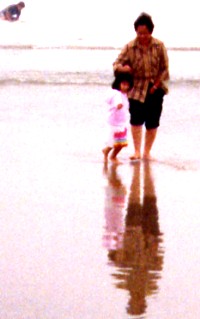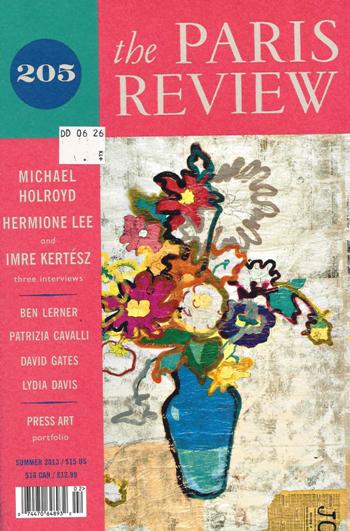 |
  Đạp thuyền trên hồ Xuân Hương,
Đà Lạt, 1955, Gấu thực sự ngạc
nhiên, mình đang sống trong một thế giới khủng khiếp. INTERVIEWER Trong Hồ Sơ K. ông phán, chỗ của tớ không phải ở trong lịch sử, mà ở bàn viết. Kertesz: Tớ đếch viết ở bàn
viết. Nhưng thôi, bỏ ba chuyện lẻ tẻ đi vô đời tư,
nhảm lắm! Imre
Kertész, The Art of Fiction No. 220 Interviewed
by Luisa Zielinski INTERVIEWER In your
Nobel Lecture you said, “The nausea and depression to which I awoke
each
morning led me at once into the world I intended to describe.” Did
writing
subdue this condition? IMRE KERTÉSZ I was
suspended in a world that was forever foreign to me, one I had to
reenter each
day with no hope of relief. That was true of Stalinist Hungary, but
even more
so under National Socialism. The latter inspired that feeling even more
intensely. In Stalinism, you simply had to keep going, if you could.
The Nazi
regime, on the other hand, was a mechanism that worked with such brutal
speed
that “going on” meant bare survival. The Nazi system swallowed
everything. It
was a machine working so efficiently that most people did not even have
the
chance to understand the events they lived through. To me, there
were three phases, in a literary sense. The first phase is the one just
before
the Holocaust. Times were tough, but you could get through somehow. The
second
phase, described by writers like Primo Levi, takes place in medias res,
as
though voiced from the inside, with all the astonishment and dismay of
witnessing
such events. These writers described what happened as something that
would
drive any man to madness—at least any man who continued to cling to old
values.
And what happened was beyond the witnesses’ capacity for coping. They
tried to
resist it as much as they could, but it left a mark on the rest of
their lives.
The third phase concerns literary works that came into existence after
National
Socialism and which examine the loss of old values. Writers such as
Jean Améry
or Tadeusz Borowski conceived their works for people who were already
familiar
with history and were aware that old values had lost their meaning.
What was at
stake was the creation of new values from such immense suffering, but
most of
those writers perished in the attempt. However, what they did bequeath
to us is
a radical tradition in literature. INTERVIEWER Do you
consider your own works part of this radical tradition? KERTÉSZ Yes, I do, except I’m not sure whether it is my work or my illness that’s going to kill me now. Well, at least I tried to go on for as long as I could. So obviously I haven’t yet died in the attempt to come to terms with history, and indeed it looks as though I will be dying of a bourgeois disease instead—I am about to die of a very bourgeois Parkinson’s. INTERVIEWER Is writing a means of survival? KERTÉSZ I was able
use my own life to study how somebody can survive this particularly
cruel brand
of totalitarianism. I didn’t want to commit suicide, but then I didn’t
want to
become a writer either—at least not initially. I rejected that idea for
a long
time, but then I realized that I would have to write, write about the
astonishment and the dismay of the witness—Is that what you are going
to do to
us? How could we survive something like this, and understand it, too? To read the rest of this piece, purchase the issue. Note: Bài phỏng
vấn này, đọc thú lắm, và nó liên quan đến "nhà văn sống sót" mà TTT
viện ra khi ông trả lời Le Huu Khoa, trong bài
viết bằng
tiếng Tây, trong Mảng Lưu Vong, La
Part d’Exile: Kinh nghiệm
văn chương của ông trong thời kỳ chiến tranh từ 1954 tới 1975? Ngoài thơ
ra, tôi trải qua hai giai đoạn đánh dấu bằng hai tác phẩm văn xuôi.
Cuốn đầu, Bếp Lửa, 1954, miêu tả không khí Hà-nội
trước 1954; đi và ở đều là những chọn lựa miễn cưỡng, chia lìa hoặc cái
chết. Lập
tức có phản ứng của những nhà văn cách mạng. Trong một bài điểm sách
trên Văn Nghệ, một nhà phê bình hỏi tôi:
"Trong khi nhân dân miền Bắc đất nước ra công xây dựng xã hội chủ
nghĩa,
nhân vật trong Bếp Lửa đi đâu?".
Tôi trả lời: "Anh ta đi đến sự huỷ diệt của lịch sử," mỗi nhà văn là
một kẻ sống sót. (1) INTERVIEWER Kertesz: Có
đấy, nhưng không phải cho mọi người INTERVIEWER Nhưng cho ông?
|
|